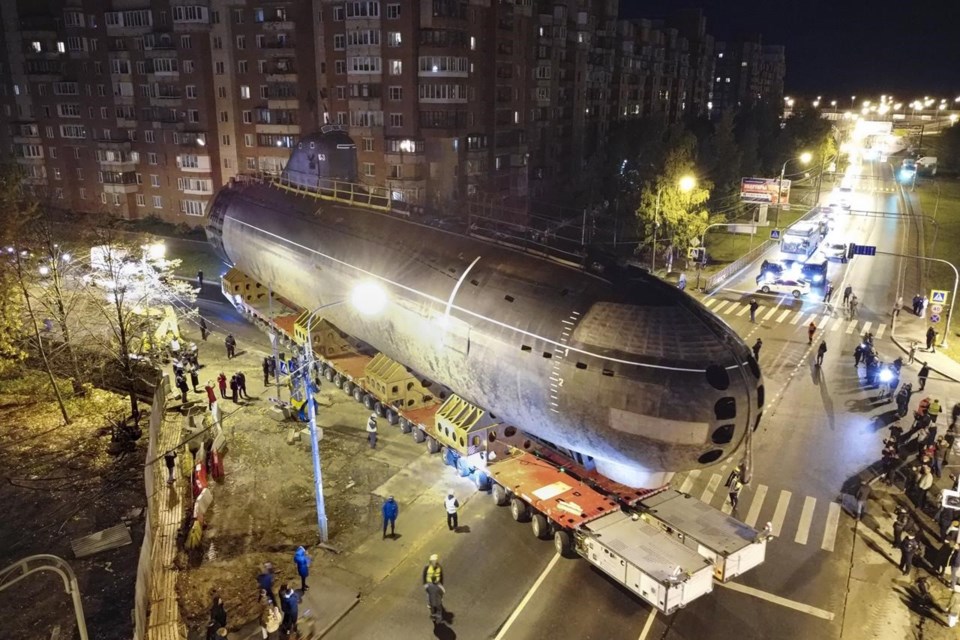BRUSSELS (AP) — Russian President Vladimir Putin would be crossing a “very important line” if he were to order the use of nuclear weapons in Ukraine, NATO Secretary-General Jens Stoltenberg warned Thursday, as both the military alliance and Russia are due to hold nuclear exercises in the next few days.
NATO is holding its exercise, dubbed “Steadfast Noon,” next week. The long-planned maneuvers are conducted around the same time every year and run for about one week. They involve fighter jets capable of carrying nuclear warheads, but do not involve any live bombs.
Russia usually holds its own maneuvers around the same time, and NATO is expecting Moscow's exercise of its nuclear forces sometime this month. Stoltenberg said NATO will “closely monitor” what Russia is up to.
Asked what NATO would do if Russia launched a nuclear attack, Stoltenberg said: “We will not go into exactly how we will respond, but of course this will fundamentally change the nature of the conflict. It will mean that a very important line has been crossed.”
He added that “even any use of a smaller nuclear weapon will be a very serious thing, fundamentally changing the nature of the war in Ukraine, and of course that would have consequences.”
Stoltenberg's remarks came after a meeting of NATO's secretive Nuclear Planning Group, which was held among defense ministers in Brussels, as concerns deepen over Putin’s insistence that he will use any means necessary to defend Russian territory.
The meeting, which usually happens once or twice a year, comes amid high tension as some NATO allies, led by the U.S., supply Ukraine with advanced weapons and munitions to defend itself against Russian aerial attacks.
“Irresponsible and reckless rhetoric is dangerous,” U.S. Defense Secretary Lloyd Austin said of Russian threats to potentially use nuclear weapons in Ukraine. However the U.S. has not seen the need to make any changes to its current military posture or response, Austin said.
European Union foreign policy chief Josep Borrell also warned Putin not to cross that threshold. “Any nuclear attack against Ukraine will create an answer, not a nuclear answer but such a powerful answer from the military side that the Russian Army will be annihilated,” he said in a speech in Bruges, Belgium.
NATO is keeping a wary eye on Russia’s movements in its war with Ukraine, but has so far seen no change in its nuclear posture. Putin's nuclear exercises though could make it more difficult for NATO to understand what Russia's intentions might be, potentially increasing the risk of an accident.
“Russia will also be conducting its annual exercise, I think, the week after or just after the annual exercise,” U.K. Defence Secretary Ben Wallace told reporters Wednesday. But “what we don’t want is to do things out of routine.”
“This is a routine exercise and it’s all about readiness,” Wallace said, just as “NATO’s meeting is all about making sure we are ready for anything. I mean, that is the job of this alliance — to make sure that the 30 partners together are ready for what is thrown at us. And we have to continue to work at that.”
Fourteen NATO member countries will be involved in "Steadfast Noon," which was planned before Russia invaded Ukraine on Feb. 24. The main part of the maneuvers will be held more than 1,000 kilometers (625 miles) from Russia.
NATO as an organization doesn't possess any weapons. The nuclear weapons nominally linked to the alliance remain under the firm control of three member countries — the U.S., the U.K. and France. But France insists on maintaining its nuclear independence and doesn't take part in Nuclear Planning Group meetings.
With the Russian army retreating in some places when faced with Ukrainian forces armed with Western weapons, Putin raised the stakes by annexing four Ukrainian regions and declaring a partial mobilization to buttress the crumbling front line.
As his war plans have gone awry, Putin has repeatedly signaled that he could resort to nuclear weapons to protect Russian gains. The threat is also aimed at deterring NATO nations from sending more sophisticated weapons to Ukraine.
In an interview with France 2 television, French President Emmanuel Macron suggested that France would not respond with a nuclear strike. He also warned about the responsibilities of leaders when it comes to nuclear rhetoric and said he has spoken to Putin “several times.”
“We have a (nuclear) doctrine, which is clear,” Macron said. “The dissuasion is working. But then, the less we talk about it, the less we brandish the threat, the more credible we are.”
“Too many people are talking about it,” he said.
___
Sylvie Corbet in Paris and Tara Copp in Washington contributed to this report.
___
Follow the AP’s coverage of the war at
Lorne Cook, The Associated Press




